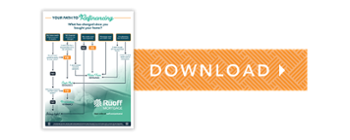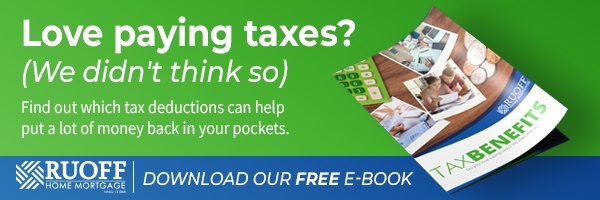Rachel Jett
Rachel Jett
Every day at Ruoff, we talk to a lot of people who are looking into refinancing their homes but aren’t always sure whether or not they should and if so, what options they have. Refinancing is something we hear about all of the time on TV, social media and in advertisements everywhere – lower your rate, lower your payment, get cash from the equity in your home, pay off your mortgage faster! Those are all good things – but which is right for you
Here are some questions to ask yourself when thinking about refinancing:
- How long do I plan to stay in my home?
- When would I like to have my home paid off?
- What has changed since I purchased my home or refinanced last? (Think changes in income, credit score, home value, retirement, etc.)
- Do I have equity in my home right now? How much is the home worth today compared to what is owed on the current mortgage?
- What type of loan do I have now? (FHA/Conventional/VA, Current Rate, Current Term, Mortgage Insurance, etc.) Would I benefit from a different loan type?

What options do I have for a refinance?
Lower Your Rate
This one is pretty self-explanatory. A lower interest rate will allow more of your monthly payment to go towards the principal balance of your loan. If your only goal with the refinance is to lower your interest rate (and keep the same term) a good rule of thumb is to lower by about .5% to 1% to see a real benefit.
Lower Your Payment
This is closely related to lowering your rate. If the term of your loan (aka length of your loan) stays the same and your interest rate goes down, you will see a decrease in payment. Another way to lower your payment is to remove mortgage insurance (discussed later in this post).
Some people will opt to lengthen a term to lower their payment. For example, if you are 10 years into a 30-year loan but your circumstances change and you are struggling to make your payment, it may make sense to refinance back into a new 30-year loan. In this case, you will be making payments for longer, but in some situations, it may be the best option available.
Pay Off Your Loan Sooner
Shortening the term of your loan can be the best long-term money-saving option for a lot of borrowers. You will potentially save tens of thousands of dollars in interest, over the term of your loan in a 15-year term vs. a 30-year term. You can expect a higher payment with a 15-year term, but it will not be double since there is less interest charged.
Refinancing into the shortest term you can afford monthly is the best way to save money on interest and will allow you to be debt free sooner. Think about what you want to do in the future and when you want to be done paying a mortgage. Typically, lenders offer lower interest rates with shorter-term mortgages. At Ruoff, we offer many term options ranging from 10-30 years.

Mortgage Insurance
Unless you have at least a 20% down payment when you purchase your home, you can expect to pay some type of mortgage insurance with most loan programs. If you are in a conventional loan, eventually the private mortgage insurance will go away – once you have at least 78% Loan to Value (LTV). If you are in an FHA loan in many cases (especially if you purchased after June 2013) you will need to refinance your loan to get out of mortgage insurance once you have at least 80% LTV. Some loan programs do not require PMI.
You build equity in your home simply by making your monthly payments, which then reduce your principal balance. Changes in the market can also affect equity – if property values in your area increase your home could be quickly worth more than you paid for it (or owe on it). If you have enough equity to get out of mortgage insurance, it is definitely a huge benefit.
Debt Consolidation - Home Improvements - Access to Cash
There are a lot of reasons to take advantage of the equity in your home.
You can borrow against the existing equity in your home. Those funds can be used to pay off your existing mortgage, plus have extra money for:
- savings
- home improvements
- debt consolidation
- whatever else you need to use it for.
Some borrowers will use these funds to pay for large purchases like home improvements or additions, weddings, college, vehicle purchases, vacations, etc. A mortgage will usually carry a lower interest rate than a credit card or other type of loan. Mortgage interest paid is often tax deductible, compared to other loans which are not. If you have large purchases coming up or credit card balances that are not going down over time, it is definitely worth a look at a refinance.

Costs
Any time you do a refinance there will be some costs associated, but normally the benefits far outweigh any fees. Most refinances will require a new appraisal on the property to determine value. There will also be title work required (similar to a purchase transaction) as well as any state or lender fees that are charged. It is standard to have those costs included in your new loan, so you don’t pay anything out of pocket for the refinance. Just be sure to take a look at what those costs are compared to what you are saving or accomplishing long term to make sure the refinance is beneficial to your situation.
Questions? Want to see if a refinance may be a good option for you? Reach out to us at Ruoff Home Mortgage!
.png?width=375&height=150&name=MicrosoftTeams-image%20(63).png)


